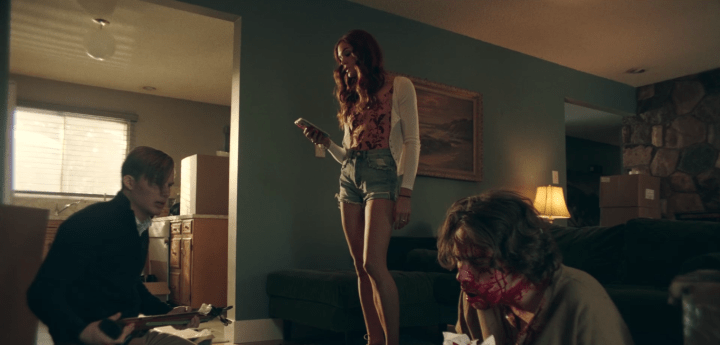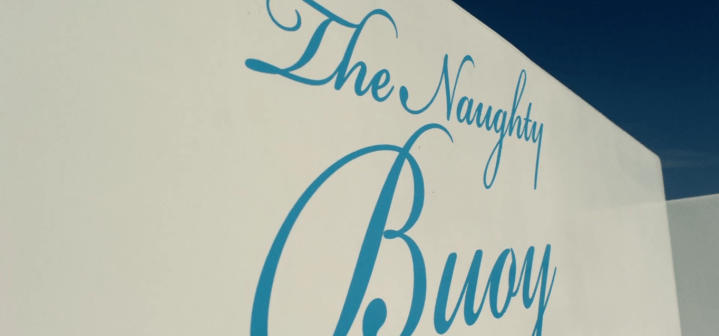Harpoon. 2019. Directed & Written by Rob Grant.
Starring Emily Tyra, Munro Chambers, Christopher Gray, & Brett Gelman.
775 Media Corp
Rated 14A / 83 minutes
Comedy / Horror
★★★★1/2
Disclaimer: Yarrr.
Here be spoilers!
 Father Gore isn’t huge on comedy, even the dark kind he prefers most. That being said, when a comedy— horror or otherwise— works well, it really works. The best brand of comedy is the sort that can get debilitating in its honesty and rawness. That’s why satire is its greatest form with an ability to speak truth to power. Rob Grant’s latest film isn’t satire, yet it’s close to being one about friendships, love, and the male ego.
Father Gore isn’t huge on comedy, even the dark kind he prefers most. That being said, when a comedy— horror or otherwise— works well, it really works. The best brand of comedy is the sort that can get debilitating in its honesty and rawness. That’s why satire is its greatest form with an ability to speak truth to power. Rob Grant’s latest film isn’t satire, yet it’s close to being one about friendships, love, and the male ego.
Harpoon is the story of Jonah (Munro Chambers), Sasha (Emily Tyra), and Richard (Christopher Gray)— a trio of friends with issues. Sasha and Richard are in a rocky relationship, and the film begins with Richard beating the shit out of his best buddy Jonah, whom he believes is sleeping with Sasha. After it’s all cleared up that nobody’s been cheating, they head out on Richard’s bougie boat for a day trip. Once they’re on the ocean, the bonds of their relationships begin to come unglued. What started as a day at sea with friends ends in betrayal, jealousy, and violence.
The screenplay draws off everything from Edgar Allan Poe to Aristotle, featuring a Greek chorus, tongue-in-cheek narration from the effortlessly hilarious Brett Gelman, to create a tensely funny comedy with one ghastly mean horror streak. In an age of shitty men being exposed, Grant’s story also feels like a spear gun to the patriarchal gut. His film— above ideas of betrayal in friendship and romantic love— strikes at the heart of male insecurity in a way that doesn’t have to feel overbearing for it to get this point across.

“Superstitions on a boat
are a powerful thing.”
 The first introduction we get to the friends is a vicious beating Richard gives Jonah, while Sasha tries to intervene. With this as the starting point there’s a clear, serious divide between the men. Gelman initially opens his narration with a brief mention of Aristotle’s view on friendship, of which there are three types: utility (people benefit from one another), pleasure (people are drawn to others via desirable qualities), and the good (mutual admiration of the other’s goodness / a want on each part to help the other strive for goodness). What’s curious about this quick Aristotle reference is that not only is friendship a central theme of the film, the philosopher’s further concept of egoism is actually even more important to the story.
The first introduction we get to the friends is a vicious beating Richard gives Jonah, while Sasha tries to intervene. With this as the starting point there’s a clear, serious divide between the men. Gelman initially opens his narration with a brief mention of Aristotle’s view on friendship, of which there are three types: utility (people benefit from one another), pleasure (people are drawn to others via desirable qualities), and the good (mutual admiration of the other’s goodness / a want on each part to help the other strive for goodness). What’s curious about this quick Aristotle reference is that not only is friendship a central theme of the film, the philosopher’s further concept of egoism is actually even more important to the story.
Egoism is the view that one’s self should always be the motivation / goal of their actions. On a basic level of survival, this is natural. When a situation is more complicated— say, a situation involving a strained friendship between two men fighting over a woman— egoism isn’t so cut and dry. In fact, one of the simplest analogies of egoism’s faults involves the scenario of two men vying for the hand of one woman, exactly like Harpoon‘s plot. This plays into the screenplay’s themes of toxic masculinity, which we’ll come back to shortly.
The plot actually runs on Aristotle’s egoism with Jonah going out of control. We discover he killed Richard’s previous pregnant girlfriend. It wasn’t out of a desire to protect his best friend— already beyond fucked up as is— but to make sure a series of events didn’t occur to take Sasha away from him. He manipulates most of the events aboard the boat, which acts as catalyst for the plot, in the name of getting rid of Richard so he could have Sasha to himself. The only thing that matters to Jonah is his own happiness.
Tough to imagine Aristotle would’ve agreed with his methods.
The basic concept of egoism connects in an interesting way with a moment of metafiction in Grant’s screenplay. The three characters discuss Edgar Allan Poe’s only complete novel, The Narrative of Arthur Gordon Pym of Nantucket. In the novel, men get stranded at sea and eventually resort to cannibalism. On its face, the Poe tale is a great addition because of the real life Richard Parker, who came to a metafictional fate nearly 50 years after the novel’s publication when his own life at sea mirrored the novel’s plot, and so layers of metafiction open up here with the film’s plot, too. Deeper than this is that Poe’s characters, as well as Grant’s, are all in one of the ultimate predicaments of egoism there could possibly be: to eat another person to survive, or be eaten.

“Why don’t you be a man for once?”
 Other than egoism as a philosophy, Harpoon involves horrors of the male ego, particularly when it’s wounded. Early on there’s a toxic brand of masculinity at work when Richard solves his problems with fists. Just the way she’s constantly told by Jonah the gift they got for Richard isn’t a harpoon, it’s a spear gun displays a sexist male tendency to perpetually correct women right down to petty language nitpicks. After discovering the betrayal, Richard continually tells Jonah to be a man, or that he chose “the bitch route” by not confessing to sleeping with Sasha.
Other than egoism as a philosophy, Harpoon involves horrors of the male ego, particularly when it’s wounded. Early on there’s a toxic brand of masculinity at work when Richard solves his problems with fists. Just the way she’s constantly told by Jonah the gift they got for Richard isn’t a harpoon, it’s a spear gun displays a sexist male tendency to perpetually correct women right down to petty language nitpicks. After discovering the betrayal, Richard continually tells Jonah to be a man, or that he chose “the bitch route” by not confessing to sleeping with Sasha.
The situation gets most dangerous once the male ego is threatened. The argument of “who was better” re: sex with Sasha shatters the sliver of civility built up after the second flash of violence led to a semi-truce between the trio. Jonah is especially shattered to learn he’s not only not better than Richard in bed, his sex is “vanilla” and boring. After this he fully goes off the deep end.
In the midst of caveman competition, Sasha is defined against hypermasculinity in a typical gender role of “girlfriend, mother, and referee.” She’s treated like a caretaker, or at times, worse, an object. She’s symbolic of women’s overall burden, in that they’re expected to take care of men, whether shutting down a fictional dick measuring contest, or trying to school men in the real world about bodily autonomy. Egoism in Jonah and Richard significantly involves Sasha. Their will to be the one she chooses erases her choice. They only care about beating one another, figuratively / physically, not about Sasha’s choice. In the end, their selfishness leaves her literally stranded at sea. We can conceive her situation as a metaphor about the way silly testosterone-fuelled games of ego and power have real damaging effects on women’s lives.
Jonah is likewise a perfect character metaphor. He represents the self-proclaimed male feminist who’s secretly exactly like the men he claims to hate. He presents himself as an ally to Sasha, aligning himself with her against Richard. He acts like him and his best friend are vastly different. For much of the film, we’re led to believe they’re not the same type of men. Once the big reveal comes out it’s obvious Jonah’s criticisms of Richard were only ever projections rooted in his own behaviour. He’s actually a whole other degree of horrible. Not to mention delusional. He convinces himself that even after explaining to Sasha how he murdered another woman she’ll somehow not be worried he’d do the same to her, that she could look past his violence towards other women and be with him.
Parallel his action with some of the loud, proud male feminists we’ve seen exposed as being sexists, misogynists, and, in certain cases, outright abusers. They’re convinced their quiet transgressions, like Jonah’s, will go unnoticed against those they perceive as the real male problem. In the end, the truth comes out by virtue of their own faults. Jonah hears what he wants when it comes to Sasha, making it seem like she encouraged him to do what he’s done. Again, it circles around to a misogynistic blame game where women are perceived as having asked for something they most certainly didn’t want, becoming a scapegoat for the rage of inadequate men.
 Harpoon is definitely one of Father Gore’s favourite horrors of 2019. Funny and horrific without any caveats. Additions like Poe and Aristotle are a big juicy bonus. All three of the leads are perfectly wry and their comedic timing works wonders for the screenplay. The trio’s intermittently hilarious / macabre predicament is entertaining for every last second of its 83-minute runtime.
Harpoon is definitely one of Father Gore’s favourite horrors of 2019. Funny and horrific without any caveats. Additions like Poe and Aristotle are a big juicy bonus. All three of the leads are perfectly wry and their comedic timing works wonders for the screenplay. The trio’s intermittently hilarious / macabre predicament is entertaining for every last second of its 83-minute runtime.
In spite of a limited claustrophobic setting and the familiar genre setup of a few people trapped together, Grant keeps his audience entertained with twists, turns, and a few splashes of blood. If reading deep into a film is your thing, there are enough places to dig out meaning from Grant’s work on top of all the creepy fun. It’ll be exciting to see what he conjures up next. Father Gore won’t lie— he hopes it’ll be something HORRIFIC.


Pingback: From Our Members’ Desks (Aug. 5, 2019) | Online Film Critics Society